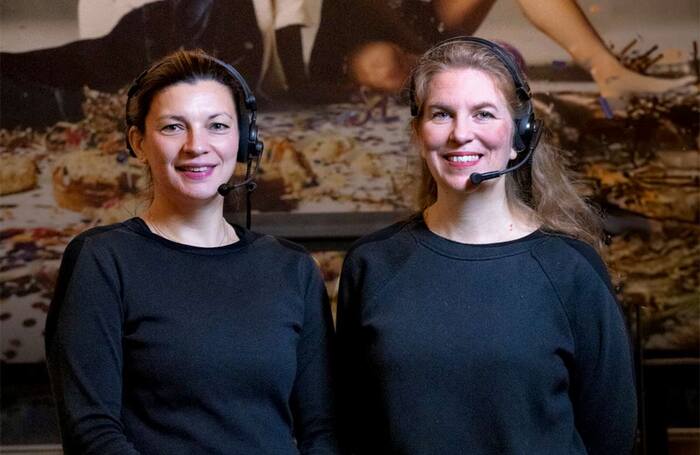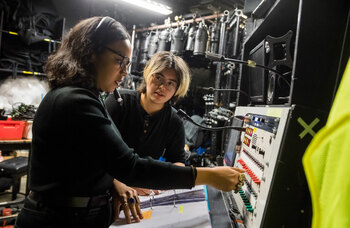Stage managers call for more job-shares in backstage roles
Stage managers are urging the industry to embrace the value of job-sharing, recommending its benefits for accessibility, mental health and those with caring responsibilities.
It comes as the Stage Management Association begins to promote flexible backstage roles as part of a new job-sharing section in its industry newsletter.
The SMA’s Freelist of freelance stage managers, sent out to theatre producers and employers each month, will now make clear which of its members are interested in dividing up their work in a job-share, or which individuals are already doing so.
Lauren Patman and Anna-Maria Casson, a stage managing duo who have teamed up in the past year to work on three productions at London’s Almeida Theatre, told The Stage the sector needed to adapt at a time when it was "haemorrhaging" skilled workers.
Casson said: "Since Covid, experienced people are already going into other industries, because they feel that this one doesn’t work for them."
Patman added: "We hope to support stage managers who want to job-share, suggest to them how to make the timings and the contract work, and try to encourage producers who are nervous or sceptical and say: ‘Look, it does work.’"
Continues...
More than 35 job-sharing stage managers and stage managers keen to try out the system have already joined the job-share section on the SMA’s Freelist, with the SMA noting that it could help those with children to remain an active part of the workforce and even improve work-life balance.
Patman and Casson, who have shared the company stage manager role in the Almeida’s recent productions of Alma Mater and Cat on a Hot Tin Roof, told The Stage that the system was a boon for those trying to protect their work-life balance and spend more time with families.
But they also pointed to the positive impact on the wider team, who gain access to double the skills, energy and professionalism.
"Our deputy stage manager who we’ve worked with for the last two shows said the real benefit of working with a job-sharing duo as your boss is that when you get to the tech period [of a show], instead of having [to deal with] one really exhausted person who can be snappy, or who doesn’t have time for you, you’ve got two people who are fresher," Casson explained.
She added: "Individually, there’s less mental pressure, because you know that there’s someone sharing those big decisions at the top, and you’ve got someone to bounce ideas off."
For Patman, having a partner allowed for more time for ideas to "percolate". On days off, when a peer was picking up the role, there was a "change of focus" that could benefit a production in development, she said.
"It’s the classic thing of walking away from the crossword and coming back the next day and having the answer, which you can’t do if you’re not job-sharing," Patman added.
Cheryl Firth, a stage manager who has worked at theatres including the Royal Shakespeare Company and the Royal Court, last year experienced a stroke.
She told The Stage that if producers and theatres were more willing to allow job-sharing, she would not have to contemplate leaving the industry.
She said: "I had a stroke last year. I obviously wondered: ’How the hell do you get back into work as a company stage manager when you can’t work full-time?’ Sadly, it’s not something everyone’s been willing to support."
Firth had managed to secure a job-sharing role at the Kiln Theatre, on the venue’s production of English, but hadn’t been able to find such flexibility since.
"I think the industry needs to be more accessible and since the pandemic, everyone’s perspective has changed and life is more important – we shouldn’t be worked into the ground," she said.
Firth suggested many people understood job-shares as being "more hassle than they’re worth", but that a change in perspective was needed to prevent further talent drain.
"All the jobs I’m currently applying for aren’t in stage management or a production role. I know there’s various people who have either left the industry or are trying to figure out how to move on from stage management due to a lack of support," she said.
Andy Rowley, who has worked in stage, production and arts management since 1980 at theatres including Manchester Royal Exchange and Theatre Clwyd, told The Stage the time was right to embrace job-sharing.
Rowley, chief executive of the Stage Management Association, said "more flexibility is good for the industry".
"Producers shouldn’t fear it," Rowley insisted, adding: "Two people have more skills than one. You have a slightly different take on the job; it’s better for everyone."
Production News
Recommended for you
Production News
Recommended for you
Most Read
Across The Stage this weekYour subscription helps ensure our journalism can continue
Invest in The Stage today with a subscription starting at just £7.99
















